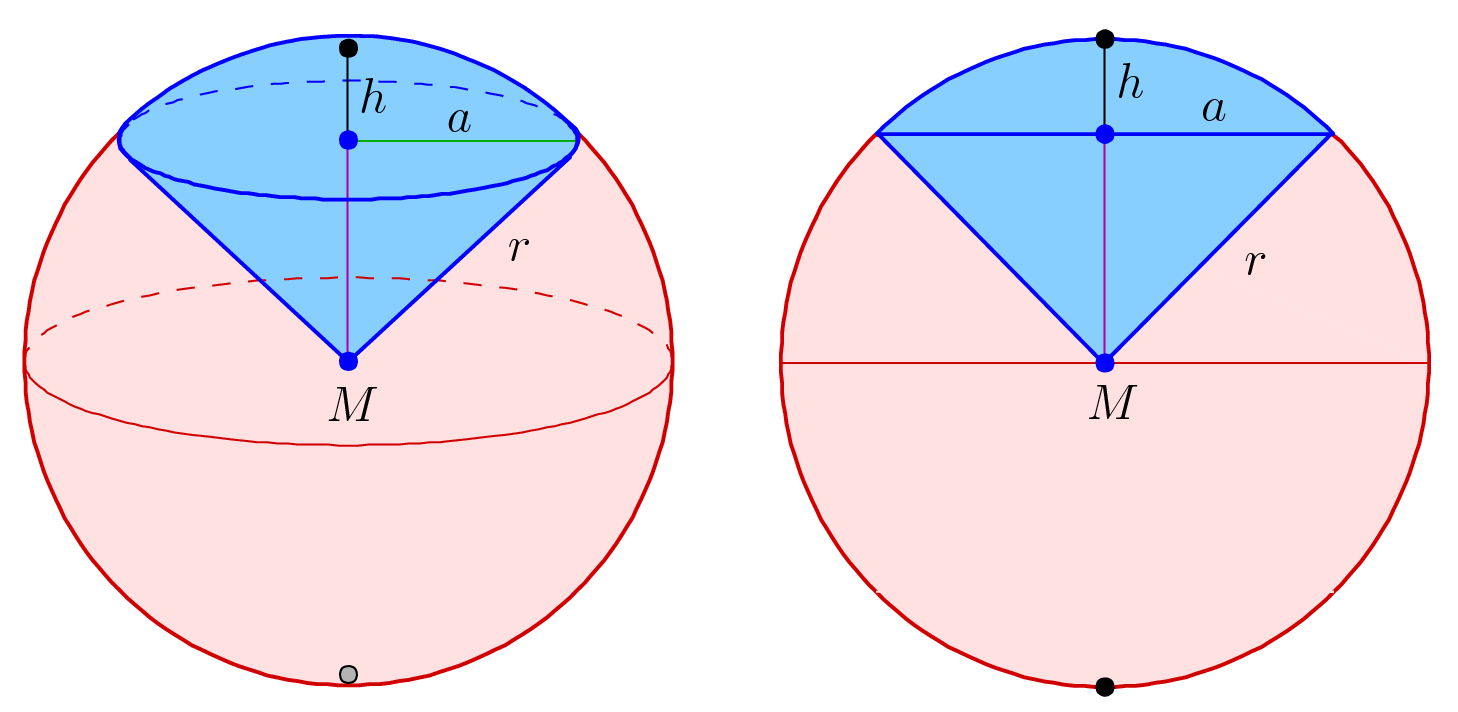Spherical sector on:
[Wikipedia]
[Google]
[Amazon]

 In
In

 In
In geometry
Geometry (; ) is a branch of mathematics concerned with properties of space such as the distance, shape, size, and relative position of figures. Geometry is, along with arithmetic, one of the oldest branches of mathematics. A mathematician w ...
, a spherical sector, also known as a spherical cone, is a portion of a sphere
A sphere (from Ancient Greek, Greek , ) is a surface (mathematics), surface analogous to the circle, a curve. In solid geometry, a sphere is the Locus (mathematics), set of points that are all at the same distance from a given point in three ...
or of a ball
A ball is a round object (usually spherical, but sometimes ovoid) with several uses. It is used in ball games, where the play of the game follows the state of the ball as it is hit, kicked or thrown by players. Balls can also be used for s ...
defined by a conical boundary with apex at the center of the sphere. It can be described as the union of a spherical cap and the cone
In geometry, a cone is a three-dimensional figure that tapers smoothly from a flat base (typically a circle) to a point not contained in the base, called the '' apex'' or '' vertex''.
A cone is formed by a set of line segments, half-lines ...
formed by the center of the sphere and the base of the cap. It is the three-dimensional analogue of the sector of a circle
A circle is a shape consisting of all point (geometry), points in a plane (mathematics), plane that are at a given distance from a given point, the Centre (geometry), centre. The distance between any point of the circle and the centre is cal ...
.
Volume
If the radius of the sphere is denoted by and the height of the cap by , thevolume
Volume is a measure of regions in three-dimensional space. It is often quantified numerically using SI derived units (such as the cubic metre and litre) or by various imperial or US customary units (such as the gallon, quart, cubic inch) ...
of the spherical sector is
This may also be written as
where is half the cone aperture angle, i.e., is the angle between the rim of the cap and the axis direction to the middle of the cap as seen from the sphere center. The limiting case is for approaching 180 degrees, which then describes a complete sphere.
The height, is given by
The volume of the sector is related to the area of the cap by:
Area
The curvedsurface area
The surface area (symbol ''A'') of a solid object is a measure of the total area that the surface of the object occupies. The mathematical definition of surface area in the presence of curved surfaces is considerably more involved than the d ...
of the spherical sector (on the surface of the sphere, excluding the cone surface) is
It is also
where is the solid angle
In geometry, a solid angle (symbol: ) is a measure of the amount of the field of view from some particular point that a given object covers. That is, it is a measure of how large the object appears to an observer looking from that point.
The poin ...
of the spherical sector in steradian
The steradian (symbol: sr) or square radian is the unit of solid angle in the International System of Units (SI). It is used in three-dimensional geometry, and is analogous to the radian, which quantifies planar angles. A solid angle in the fo ...
s, the SI unit of solid angle. One steradian is defined as the solid angle subtended by a cap area of .
Derivation
The volume can be calculated by integrating the differential volume element over the volume of the spherical sector, where the integrals have been separated, because the integrand can be separated into a product of functions each with one dummy variable. The area can be similarly calculated by integrating the differential spherical area element over the spherical sector, giving where is inclination (or elevation) and is azimuth (right). Notice is a constant. Again, the integrals can be separated.See also
*Circular sector
A circular sector, also known as circle sector or disk sector or simply a sector (symbol: ⌔), is the portion of a disk (a closed region bounded by a circle) enclosed by two radii and an arc, with the smaller area being known as the ''minor ...
— the analogous 2D figure.
* Spherical cap
* Spherical segment
* Spherical wedge
A sphere (from Greek , ) is a surface analogous to the circle, a curve. In solid geometry, a sphere is the set of points that are all at the same distance from a given point in three-dimensional space.. That given point is the ''center' ...
References
Spherical geometry {{geometry-stub